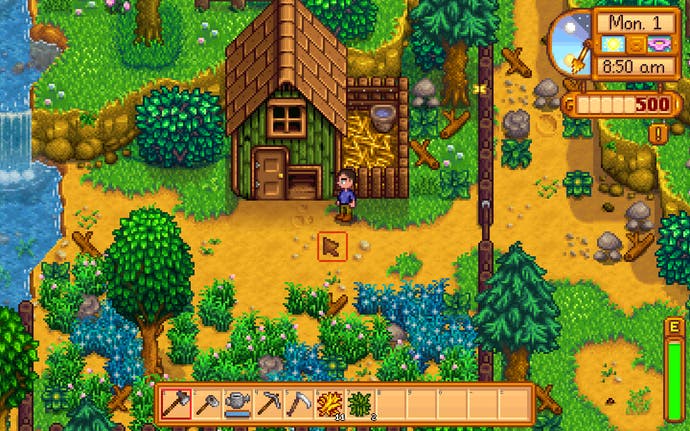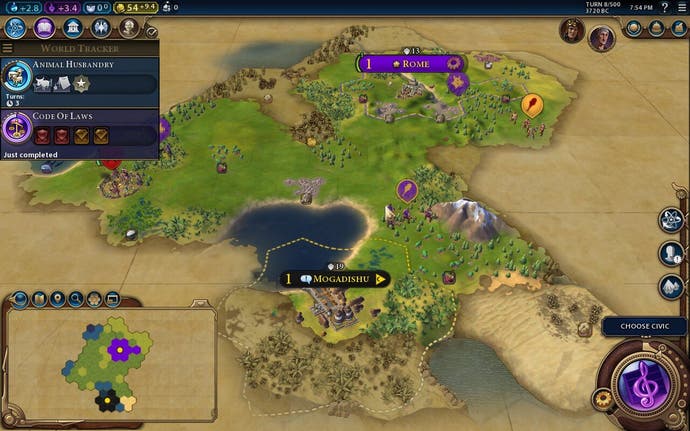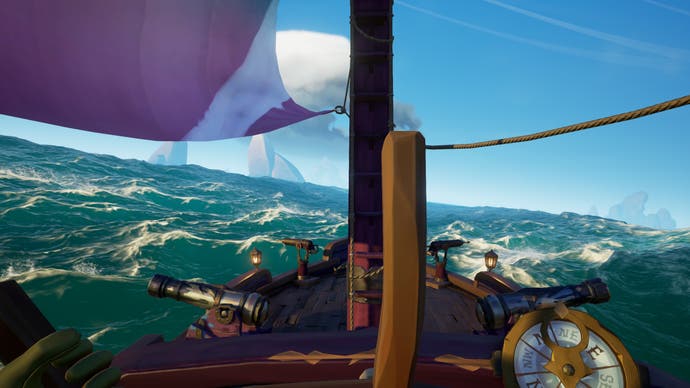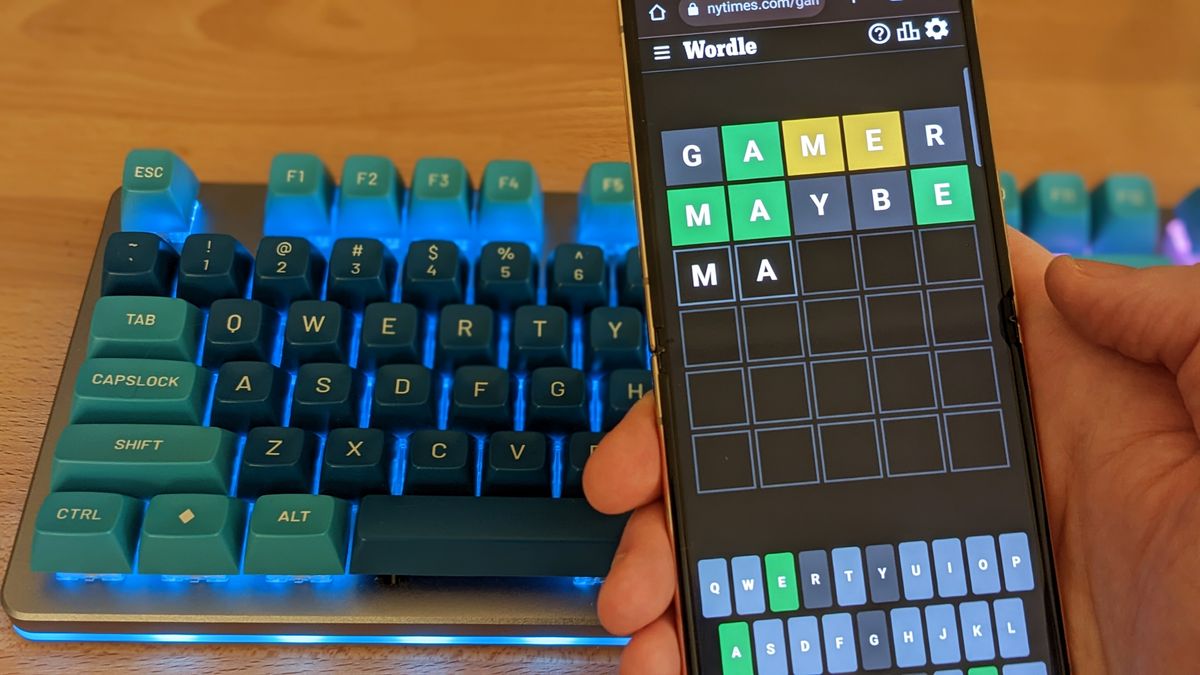Just over two years ago, a friend of mine died in their sleep. It was unexpected. Let's call them Ash, although it's not their real name. They were incredibly funny, emotionally open, and kind. And because Ash and I were friends on Steam, I know exactly how many days it's been since they died, just like I know what they were doing before they went to bed that night. They were playing Sea Of Thieves.
Many times over the last two years, I have looked at Ash's Steam profile and the games they played the most, and felt a desire to play them too. It's a desire I can't really explain, but to me, the record of what Ash was playing feels like not only an authentic record of who they were, but also a more present one. At the same time, I wonder if it's just me being terribly self-involved, inventing an extant connection in a collection of curated materials, rather than in something real.
 Image credit: Eurogamer/Rare
Image credit: Eurogamer/Rare
Since social media exploded, almost anyone who dies leaves virtual footprints to follow. How authentic is someone's Steam profile as an expression of who they are or were? I asked the Oxford Internet Institute (OII), a multidisciplinary department at the University of Oxford that conducts research on, among other things, how the internet interacts with our daily lives, if this can be pinned down and dissected by science.
Dr. Tamas Foldes of the OII, whose research background is in quantitative social and experimental psychology, outlines a lot of caveats for thinking about 'authenticity' on different social media platforms. In a scientific setting they would, for example, conduct surveys where individuals rate how genuine they feel in different settings, run experiments that manipulate variables like anonymity or audience, observe posts to spot patterns of self-expression, or use a combination of all of those things.
"I mention this because there's a good chance these methodologies are not particularly effective at studying deep and personal aspects of what it's like to be human – such as authenticity," he tells me. There's a shortage of qualitative work in this area, Dr. Foldes explains, and the quantitative work isn't standardised.
"With all those caveats aside, I believe that people's online presences on social media can differ somewhat from their offline selves," says Dr. Foldes. "This is due to the influences of self-discrepancy increasing with larger audience size." It's also much easier to engage in strategic self-expression online - think of how some social media platforms have inbuilt tools like TikTok's AR skin smoothing, for example. "But is the effect reported in the literature large enough to say people are inauthentic on online social sites? I don't think so."
 Image credit: Eurogamer/Concerned Ape
Image credit: Eurogamer/Concerned Ape
One of the other games Ash played that night was Stardew Valley, a game they have 320 hours in, and with which I am also intimately familiar. I go through phases of being hyperfocused on it, but am never disciplined enough to get past a full year, or to know what to plant when. Ash had a slight West Country burr to their voice, and when they were my Dungeon Master over a decade ago, we used to joke that every NPC in the game was a farmer from Somerset. I imagine they planted a very neat and beautiful farm, and that they played multiplayer. I imagine they would have loved last year's update allowing pets, because they loved their own cats. But these are things I must only imagine.
I ask Dr. Foldes if people behave notably differently across different types of social media, and he says there's some evidence for this. "They kind of have a platform-specific self. Each platform has its own vibe, features, and audience, which influence how authentically users present themselves," he says. "On Instagram, someone might curate enhanced photos for a wide audience, while on Discord they might share more intimate thoughts with a smaller group. Some users even have multiple accounts on the same platform." But how does this map onto gaming, if at all?
Dr. Foldes explains that the games someone plays habitually can offer insight into their preferences, but are not wholly accurately. Even with a comprehensive study, where people allow researchers to track their online and offline habits (something his lab is trying to set up), it wouldn't be straightforward.
"Game choices can be influenced by things like social circles, trends, discounts, what's available, or even just how they're feeling at the moment. Plus, many games offer different experiences – you can play the same game competitively, creatively, socially, for the story, or to solve problems," says Dr. Foldes.
Sea Of Thieves is not only the last game Ash played, but the game they played the most, with well over 500 hours on record. It's chock full of emergent player behaviour and unwritten rules - for example, sloops (the smallest ship that can be crewed by a lone player) will band together if they see a fellow sloop in trouble. I don't know these rules, because I'm not a Sea Of Thieves player, really. I booted it up to see if I could connect with what Ash liked about it, but I most enjoy playing Sea Of Thieves alone – as a quiet journey, listening to the wind and the sea. Ash played it almost every day with friends. I can see them raucous, giggly, leaping and adventuring through the virtual world and understanding all of the silently-agreed bylaws as second nature. It makes me wish I had played with them, to see that version of them.
 Image credit: Eurogamer/2K
Image credit: Eurogamer/2K
Another game was Civilization VI, which is unsurprising. They were a classicist, with several tattoos referencing Rome, or ancient gods. If you'd asked me beforehand, I would have said that Ash probably just played as the Roman emperor Trajan, but it turns out Ash was very good at Civ, having won a game with every single leader and every single difficulty available. Trying out Civ felt like a chore, because I do not have the nous or patience to either enjoy or get good at 4X games, but I soldiered on until I noticed that Ash didn't seem to have played it since early 2017. Time has moved on, and reset the 'recently played' section of their profile to read (0), so I can only see the list of games they had the most playtime on. When Civ VI launched, Ash played over 200 hours of it in the space of about a year. I wonder what that year was like for them.
"Honestly, you can tell a lot about someone just by looking at their Steam profile, if it's public," says Dr. Foldes. He notes that Steam has some social features, it's more limited in ways to express yourself, which will necessarily limit how much you can study it for self-expression. "However, because Steam centres around shared gaming interests, long-term activity records, and increased anonymity it might actually encourage more genuine behaviour."
"Some people focus on elevating their social status with levels, badges, and a big friends list," he explains. "Others are all about mastering games and collecting in-game achievements, focused on helping others by creating guides and artwork, or enjoy finishing games but aren't obsessed with getting every achievement."
This makes me go back and look at other areas of Ash's profile. They were largely a social gamer – their job, though they loved it, kept them in a relatively isolated area – which is very different from my own habits. But I can see that they have a perfect score on about a quarter of all the games they own. It looks like they went through periods of being fixated on a game and absolutely caning it, before moving on (though Sea Of Thieves was a mainstay), which is like me.
 Image credit: Eurogamer/Rare
Image credit: Eurogamer/Rare
They only reviewed five games, and very briefly, which makes me think they wanted to boost games they thought were especially deserving. They thought Return of the Obra Dinn is one of the best games ever made, and I agree. Their Wishlist gives me pause, because about a third of the list comprises games that I wrote about, wishlisted around the time I did so. If it's the case that they were reading my articles consistently, they didn't tell me, but it would have been very like them to do that. On the other hand, perhaps I am grasping for meaning. Correlation is not causality.
Dr. Foldes says that the digital footprints we leave behind "are and will continue to be effective in promoting a sense of closeness and even 'knowing'". In other words, Facebook turning pages into memorials at the request of loved ones is useful for those left behind. "If we go one step further and consider 'knowing' to mean 'getting to know someone's true self' it gets tricky. I can imagine a diary being the most intimate digital footprint someone can leave behind. I don't know of many online social spaces that come close to that level of authentic self-expression, but maybe when you know someone really closely, you know where to look."
I want to be clear and say that I can't claim the grief of Ash's closest friends and family; I miss Ash in a way that makes me text their phone number once or twice a year to say I hope they're okay. But, and this may be key, though we talked often through the internet, it had been years since I'd seen Ash in person. Our friendship at this early-mid stage of our lives was virtual. I have realised in writing this piece, perhaps belatedly, that I didn't know Ash the gamer. I knew the storyteller, the person who was writing a book about Nausicaa from Homer's Odyssey, and was sending me excerpts of it. But now they're gone, because they didn't really use Facebook or Twitter or anything else, and their Steam profile is the only thing I have left.
You'll probably have heard the Henry Scott Holland poem about death, where he says he's "only slipped away to the next room". When I look at Ash's Steam profile, it is as if, perhaps, they have only logged off for a while. They could log back on at any moment.

 23 hours ago
6
23 hours ago
6








 English (US) ·
English (US) ·